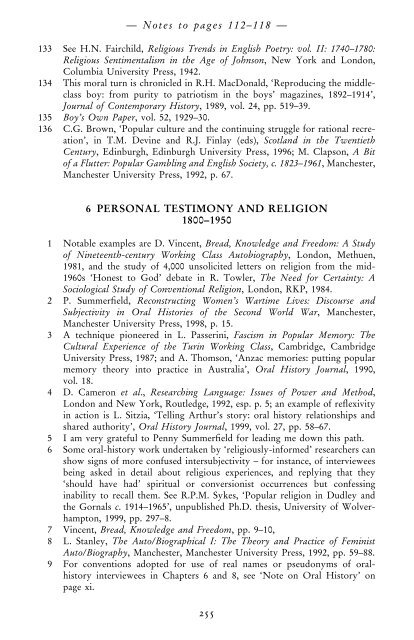The Death of Christian Britain
The Death of Christian Britain
The Death of Christian Britain
You also want an ePaper? Increase the reach of your titles
YUMPU automatically turns print PDFs into web optimized ePapers that Google loves.
— Notes to pages 112–118 —<br />
133 See H.N. Fairchild, Religious Trends in English Poetry: vol. II: 1740–1780:<br />
Religious Sentimentalism in the Age <strong>of</strong> Johnson, New York and London,<br />
Columbia University Press, 1942.<br />
134 This moral turn is chronicled in R.H. MacDonald, ‘Reproducing the middleclass<br />
boy: from purity to patriotism in the boys’ magazines, 1892–1914’,<br />
Journal <strong>of</strong> Contemporary History, 1989, vol. 24, pp. 519–39.<br />
135 Boy’s Own Paper, vol. 52, 1929–30.<br />
136 C.G. Brown, ‘Popular culture and the continuing struggle for rational recreation’,<br />
in T.M. Devine and R.J. Finlay (eds), Scotland in the Twentieth<br />
Century, Edinburgh, Edinburgh University Press, 1996; M. Clapson, A Bit<br />
<strong>of</strong> a Flutter: Popular Gambling and English Society, c. 1823–1961, Manchester,<br />
Manchester University Press, 1992, p. 67.<br />
6 PERSONAL TESTIMONY AND RELIGION<br />
1800–1950<br />
1 Notable examples are D. Vincent, Bread, Knowledge and Freedom: A Study<br />
<strong>of</strong> Nineteenth-century Working Class Autobiography, London, Methuen,<br />
1981, and the study <strong>of</strong> 4,000 unsolicited letters on religion from the mid-<br />
1960s ‘Honest to God’ debate in R. Towler, <strong>The</strong> Need for Certainty: A<br />
Sociological Study <strong>of</strong> Conventional Religion, London, RKP, 1984.<br />
2 P. Summerfield, Reconstructing Women’s Wartime Lives: Discourse and<br />
Subjectivity in Oral Histories <strong>of</strong> the Second World War, Manchester,<br />
Manchester University Press, 1998, p. 15.<br />
3 A technique pioneered in L. Passerini, Fascism in Popular Memory: <strong>The</strong><br />
Cultural Experience <strong>of</strong> the Turin Working Class, Cambridge, Cambridge<br />
University Press, 1987; and A. Thomson, ‘Anzac memories: putting popular<br />
memory theory into practice in Australia’, Oral History Journal, 1990,<br />
vol. 18.<br />
4 D. Cameron et al., Researching Language: Issues <strong>of</strong> Power and Method,<br />
London and New York, Routledge, 1992, esp. p. 5; an example <strong>of</strong> reflexivity<br />
in action is L. Sitzia, ‘Telling Arthur’s story: oral history relationships and<br />
shared authority’, Oral History Journal, 1999, vol. 27, pp. 58–67.<br />
5 I am very grateful to Penny Summerfield for leading me down this path.<br />
6 Some oral-history work undertaken by ‘religiously-informed’ researchers can<br />
show signs <strong>of</strong> more confused intersubjectivity – for instance, <strong>of</strong> interviewees<br />
being asked in detail about religious experiences, and replying that they<br />
‘should have had’ spiritual or conversionist occurrences but confessing<br />
inability to recall them. See R.P.M. Sykes, ‘Popular religion in Dudley and<br />
the Gornals c. 1914–1965’, unpublished Ph.D. thesis, University <strong>of</strong> Wolverhampton,<br />
1999, pp. 297–8.<br />
7 Vincent, Bread, Knowledge and Freedom, pp. 9–10,<br />
8 L. Stanley, <strong>The</strong> Auto/Biographical I: <strong>The</strong> <strong>The</strong>ory and Practice <strong>of</strong> Feminist<br />
Auto/Biography, Manchester, Manchester University Press, 1992, pp. 59–88.<br />
9 For conventions adopted for use <strong>of</strong> real names or pseudonyms <strong>of</strong> oralhistory<br />
interviewees in Chapters 6 and 8, see ‘Note on Oral History’ on<br />
page xi.<br />
255








